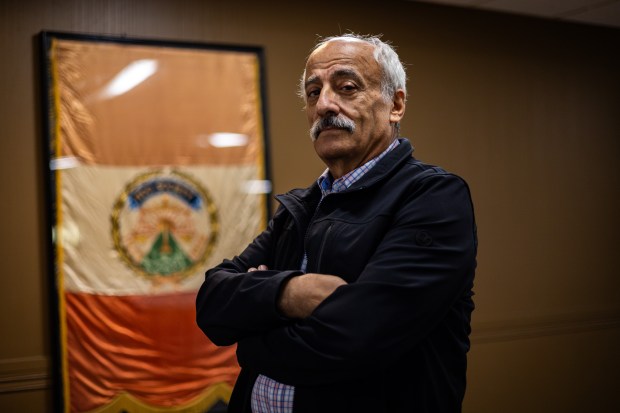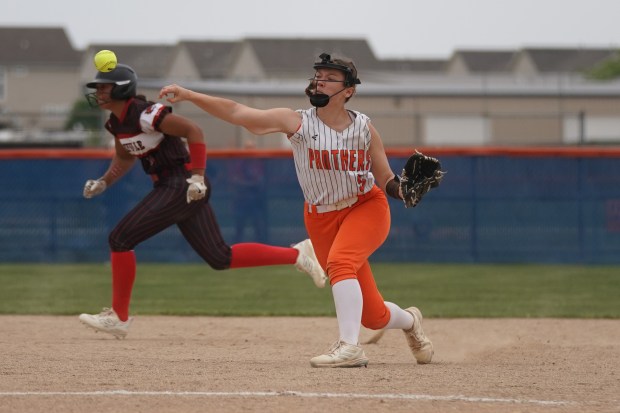PEORIA — As word reached this central Illinois town that its sister city in Lebanon had been bombed by Israel, Henri Alwan was among many residents to feel a direct sense of loss.
The airstrike last month leveled a home owned by Alwan’s cousin Elie and killed more than 20 people, including, reportedly, 12 women and two children who had sought refuge in the village of Aitou after Israel started to target the Shiite militant group Hezbollah in Lebanon. The fatalities also included a person suspected of giving aid to Hezbollah, according to news reports.
Alwan chairs the board of Peoria’s Itoo Society, formed in 1914 — with a phonetic spelling of the Middle East town — to provide aid to Lebanese immigrants in central Illinois as well as those still in their homeland. He expressed frustration at Israel and Hezbollah’s inability to maintain peace in the region.
“There could have been negotiations,” Alwan said. “It could’ve been done differently. This has been going on for a long time. They (Israel) knew about Hezbollah for a long time. They could’ve worked it out somehow.”
This week, a ceasefire was reached in the war between Israel and Hezbollah. That was welcome news to the several thousand Lebanese American residents in the Peoria area, many of whom were either born in or are considered descendants of the mountainous village of Aitou.
The Lebanese town’s primarily Christian population had initially considered itself safe from Israel’s attacks on Hezbollah in Lebanon, an outgrowth of the Jewish nation’s response to Hamas’ attacks on Israel on Oct. 7, 2023.
The Aitou descendants in Peoria are primarily associated with the Maronite Catholic Church, which considers Lebanon its spiritual home. While obedient to the Roman Catholic pope, the sect is an Eastern rite church that retains distinctive liturgical rites. The Maronite Mass is similar to the Mass in other Catholic churches, but some parts may be said in Syriac (an Aramaic language) and Arabic.
Among the Peoria-area residents with roots in Aitou is Republican U.S. Rep. Darin LaHood, who has been an ardent supporter of Israel in its war against Hamas and Hezbollah. He said Israel’s attack on Aitou reflects the complicated nature of the regional war.
“When you hear that it is a very, very Christian community, Maronite community, that there were … really outsiders that were there, it maybe helps to explain things a little bit more,” LaHood said in a telephone interview. “This wasn’t Israelis bombing Christians or people that traditionally lived in Aitou. And so, I think … that gets to understanding the nuances of what went on there.”
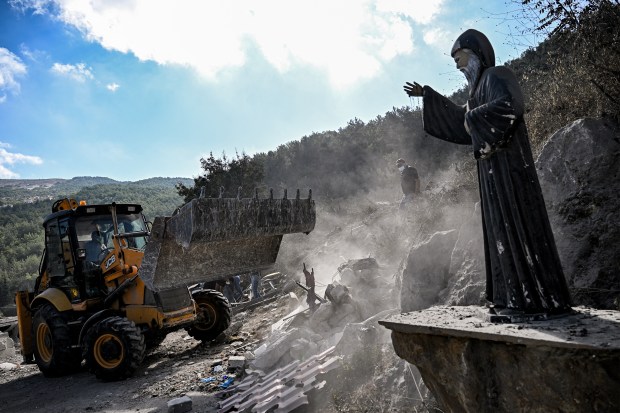
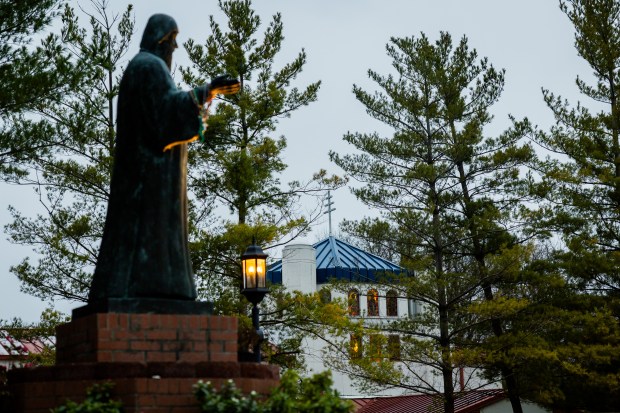
Human casualties in the regional war include the killings of tens of thousands in Gaza and more than 3,000 in Lebanon, a country established through a League of Nations mandate after World War I as a result of the dismantling of the Ottoman Empire. The country was divided into close to 20 sects, including those for Druze and Christian, or Maronite Catholic, populations and Sunni and Shiite Muslim populations, paving the way for political rivalries and polarization.
By 1975, tensions within Lebanon escalated between the Christian and Muslim populations. Lebanese Christian and Palestinian forces began fighting as Israel, Syria and Iran got involved in the bloody conflict in the ensuing years. The war ended in a stalemate in 1990, though by then Hezbollah had formed, with the backing of Iran, in opposition to Israel’s presence in southern Lebanon.
LaHood places blame for the recent bombing of Aitou squarely on Hezbollah. Four days after the Aitou attack, LaHood and Republican U.S. Rep. Darrell Issa of California, also of Lebanese heritage, sent a letter to Democratic President Joe Biden urging his administration to pressure Lebanon’s parliament to hold “immediate elections” for president as “Hezbollah’s grip on Lebanon weakens.”
“They’ve held the country hostage,” LaHood said. “They’ve been extremely destructive to Lebanon. And I hope there are no more bombings of Aitou. And we’re going to continue to push the Israelis in that direction. But again, I think it’s, when you’re fighting a terrorist element that is seeking refuge in areas where they shouldn’t be, that’s part of what war and conflict is about.”
LaHood’s family history mirrors that of many of those with ties to Lebanon in central Illinois.
An ancestor, Tannous LaHood, emigrated from Aitou in the 1880s, according to one account, taking the first name Anthony and becoming one of the earliest arrivals from what was to become Lebanon to settle in Peoria.
When the boat landed in America, LaHood and others continued their journey west, first stopping in Minnesota before following some merchants on a train heading south, according to “Beyond the Mountaintop: A History of the Itoo Society” by Peoria writer Monica Vest Wheeler.
“The train stopped at Peoria. They got out and looked around. They apparently liked what they saw of this growing Midwestern town,” according to Wheeler’s book. At the time, the railroads were looking for people to shovel coal, and LaHood and the others were immediately hired.
“They were husky, healthy and ambitious and have been described in local legend as having ‘fire in their eyes,’” according to the book. “They made $2 to $3 a week, which they considered a lot of money after the limited opportunities in Aitou.”
Lebanese immigrants also found work in manufacturing in and around Peoria, as explained in the book “The Story of Us: Stories about Peoria, Illinois, Aytou, Lebanon and the Itoo Society.” Local companies included Peoria Cordage, which manufactured twine and rope; Keystone Steel and Wire; Lucas Steel; and Kingman Plow Works. In 1909, East Peoria became home to the Holt Co., later known as the Caterpillar Tractor Co. By the mid-1920s, a survey showed over 900 products were being produced in Peoria.
Into the 1900s, another employer of immigrants were the dozens of distilleries in a city once dubbed the “Whiskey Capital of the World.”
Eventually, the Lebanese immigrants’ relatives joined them in Peoria with hopes to earn enough money to go back to their homeland. But World War I put a damper on those plans, Wheeler wrote, keeping Aitou natives in Peoria and starting “an enduring institution and tight knit community of friendship, family, commerce, compassion and charity.”
Anthony LaHood was around 90 when he died in 1947, according to the book. He is considered “the founder of the Aitou/Itoo community of Peoria, and the leader who enabled many members of his family and of his village to find opportunities for a better life in this country,” the book says.
Darin LaHood’s father, Ray, represented the Peoria area in Congress from 1995 to 2009 and later was a member of President Barack Obama’s Cabinet.
“What I tell people is, they had an American dream,” Darin LaHood said of his family from Lebanon. “They didn’t come here with any money. They didn’t know anybody. They had a strong faith in God and didn’t speak the language but came here for a better life. And so, they wound up in Peoria. And really over a period of 67 years, word got back to Aitou to come to Peoria. And so, we have this influx of immigration to Peoria.”
Over the years, the immigrants owned supermarkets and taverns. Former state Rep. Michael Unes, a Republican from the Peoria area, had a relative who owned one of those bars.
“He’s got a lot of stories of Richard Pryor coming into his bar,” Unes, an Aitou descendant who served in the legislature from 2011 to 2021, said, referring to the late comic legend, who hailed from Peoria.
“We have judges, we have lawyers, we have doctors, we have attorneys, we have elected officials all very, very proud of our communities, the state of Illinois and proud to be Americans,” Unes said of Peoria’s Lebanese community. “We take for granted, people complain that sometimes U.S. politics or Illinois politics are corrupt. And that’s unfortunate. But (the Lebanese) government is so incredibly corrupt.”
In 2014, the mayors of Peoria and Aitou signed agreements to become sister cities. At a ceremony, then-Aitou Mayor Ramone Alwan was given a large photo of Peoria’s skyline. Peoria’s mayor at the time, Jim Ardis, was given a sculpture from an Aitou artist.
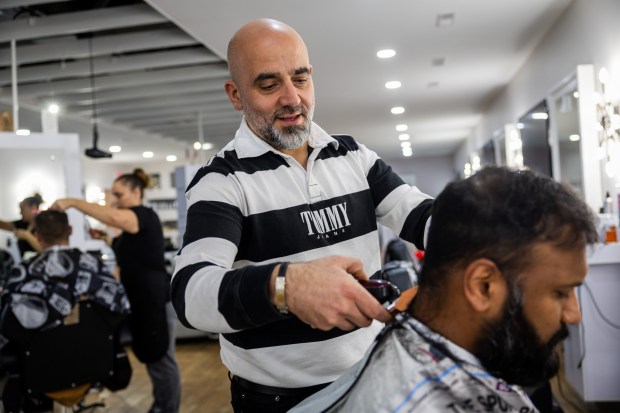
Four years earlier, Bob Khoury, his wife and four children moved to Peoria from Aitou after another wave of fighting erupted in Lebanon in 2006. He said he left behind more than 700 customers at his barber shop near Aitou, though he goes back there in the summer to see family and stay at a house he still has in the area.
Khoury now owns two barbershops in Peoria and works six days a week.
His uncle, Faddoul Khoury, immigrated to Peoria from Aitou 35 years ago and said he tries to go back to the village every year for a visit but opted not to go this year because of the bombardment.
“Until the Palestinians have their home, or somewhat of a home, the turmoil is going to continue that way,” he said. “I don’t want to be an enemy for anybody, I mean, neither the Palestinians nor the Israelis. I would wish and hope that before I die that peace (will) be prevailing in the Middle East.”
Albert Couri came to Peoria from Aitou in 1980 to be with family and to get away from the Lebanese civil war. Once in Peoria, he got a job at a nightclub run by his uncle. Since 1985, Couri has operated a meat market in town.
But at 69, he laments the continued struggles of his home country and worries about another civil war there.
“In 50 years, we’re still not stable and we always have some problem,” he said. “We don’t want to die. We want to live in peace.”
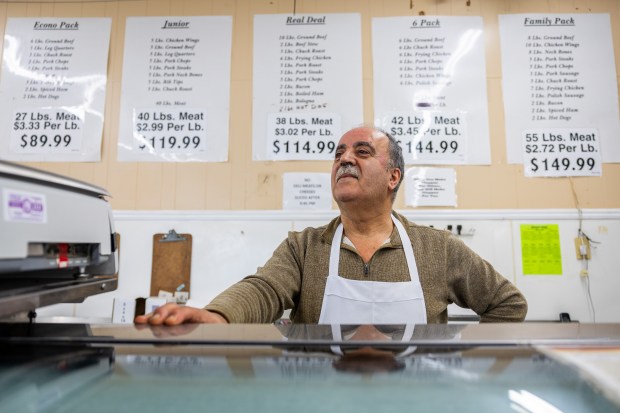
“I’m not against Israel,” Couri added. “Everybody has a right to survive. But the problem between Israel and Palestine goes 70 to 80 years back. It’s going for a long time. And we were dependent on the United States to find some solution because both of them have a right to survive and have land.”
On a cloudy Sunday in early November, the Itoo Society held the second day of its 97th annual supper. The tradition began in 1928 when a group of about 20 women cooked a meal for their friends in the Peoria area to help pay the mortgage on the original Itoo Hall.
Hundreds of people, many of them non-Lebanese locals, waited in line at the group’s current meeting hall to dine on salad, baked kibbeh, cabbage rolls, chicken and rice, green beans and pita bread. At $20 a meal, the proceeds would go toward a variety of causes within greater Peoria.
Some of the organization’s members organize a fund each month to send their distant relatives in Aitou money for food and medicine. In light of the attack, that aid has become especially crucial.
“There’s always been strife in the Middle East. And Lebanon’s been in the middle of it for years and years and years,” Carl Williams, a financial adviser whose ancestors arrived in Peoria from Lebanon more than a century ago, said at the event. “Countries try to take over, and they have in the past, and we get liberated and they take over. And what’s happening now between Israel and Lebanon, it’s sad because we’re neighbors. We should get along.”


